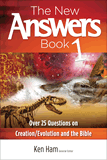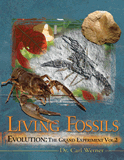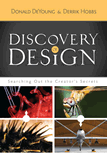Fossil Seal Walks In
“Evolution at [w]ork,” declares National Geographic News. “[T]he evolutionary evidence we have been lacking for so long,” reports BBC News. So just what is this new fossil?
News Source
- BBC News: “‘Missing Link’ Fossil Seal Walked”
A fossil discovered in 2007 in the Canadian Arctic could “hold the secret of seal evolution in its feet,” according to BBC News. The “astonishingly well preserved” fossil, which was about 65 percent complete, has been dated to 23 million years ago. Scientists named the extinct species it supposedly represents as Puijila darwini.
Because the seal-like creature had heavy limbs and flattened phalanges, likely indicating webbed feet rather than flippers, evolutionists have jumped on the find as a supposed land-based precursor of pinnipeds (seals, sea lions, and walruses). “It . . . provides us with a glimpse of what pinnipeds looked like before they had flippers,” said the Canadian Museum of Nature’s Natalia Rybczynski, one scientists involved in Puijila’s recovery.
Mary Dawson, a team member from the Carnegie Museum of Natural History, elaborated:
The remarkably preserved skeleton of Puijila had heavy limbs, indicative of well developed muscles, and flattened phalanges (finger or toe bones) which suggest that the feet were webbed—but not flippers. This animal was likely adept at both swimming and walking on land. Puijila is the evolutionary evidence we have been lacking for so long.
Is this “missing link” another solid evidence against creationists? Or have evolutionists once again interpreted a fossil according to their presuppositions? Here are two Puijila possibilities that support the second scenario:
Evolutionists have jumped on the find as a supposed land-based precursor of pinnipeds.
- Could Puijila actually be part of the otter kind? Sea otters are in many ways similar to pinnipeds, yet they have legs with—you guessed it—webbed feet.* Even the BBC News article says Puijila “look[s] like a cross between a seal and an otter,” while the National Geographic News article describes its “resemblance to a modern otter.” Also, the artist’s impression prompted more than one reader to suggest the same thing to us. Meanwhile, evolutionary paleontologists already have another seal ancestor alleged to be from the same time period as Puijila—but it has flippers, like pinnipeds we see today.
- Alternatively, if scientists showed Puijila to be distinctly pinniped (i.e., definitely not an otter), it could be a member of an original created kind that was the ancestor of all pinnipeds today. Or it could have even been from a broader created kind that included such creatures as otters and beavers (such as the seal/beaver/otter-like Castorocauda lutrasimilis could have been). Evolutionists certainly couldn’t ridicule such a scenario, as they too believe all these creatures share a common ancestor. The key difference is that creationists would see only horizontal or downhill genetic changes, with each new subgroup within the kind having less genetic information than the original ancestor.
So if this animal is so otter-like, why are evolutionists touting it as support for pinniped evolution?
Nearly every time a new fossil “missing link” is heralded by evolutionists, creationists don’t have to dig deeply to find the evolutionary presuppositions that interpret the fossil. In this case, nothing about Puijila indicates that any evolution has occurred; all it tells us for certain is that a creature like Puijila once lived on Earth. From that point, both evolutionists and creationists assimilate the find into our respective biological models. For us, their mysterious missing link is just another fascinating example of God’s creation.
Postscript: After we finished this write-up, we reviewed the Associated Press coverage on Puijila, which only confirmed our first hypothesis (above). The title the AP used was “Otter-like fossil reveals early seal evolution” (our emphasis), and AP writer Malcolm Ritter calls the fossil a “web-footed, otter-like creature.” Not only that, but Ritter reports that Puijila “resembled a river otter but had a short snout, large eyes and a thinner tail”—which still places it much closer to otters than to seals, which have flippers instead of legs and webbed feet!
So if this animal is so otter-like, why are evolutionists touting it as support for pinniped evolution? Ritter unwittingly gives us the answer:
Scientists already knew that pinnipeds evolved from land animals [despite the fact that] the earliest known fossil from that group already had flippers. So Puijila shows an earlier stage of evolution, the researchers said. [Emphasis added]
Case closed, as far as we’re concerned!
Further Reading
For More Information: Get Answers
Remember, if you see a news story that might merit some attention, let us know about it! (Note: if the story originates from the Associated Press, FOX News, MSNBC, the New York Times, or another major national media outlet, we will most likely have already heard about it.) And thanks to all of our readers who have submitted great news tips to us. If you didn’t catch all the latest News to Know, why not take a look to see what you’ve missed?
(Please note that links will take you directly to the source. Answers in Genesis is not responsible for content on the websites to which we refer. For more information, please see our Privacy Policy.)
Recommended Resources

Answers in Genesis is an apologetics ministry, dedicated to helping Christians defend their faith and proclaim the good news of Jesus Christ.
- Customer Service 800.778.3390
- Available Monday–Friday | 9 AM–5 PM ET
- © 2025 Answers in Genesis







